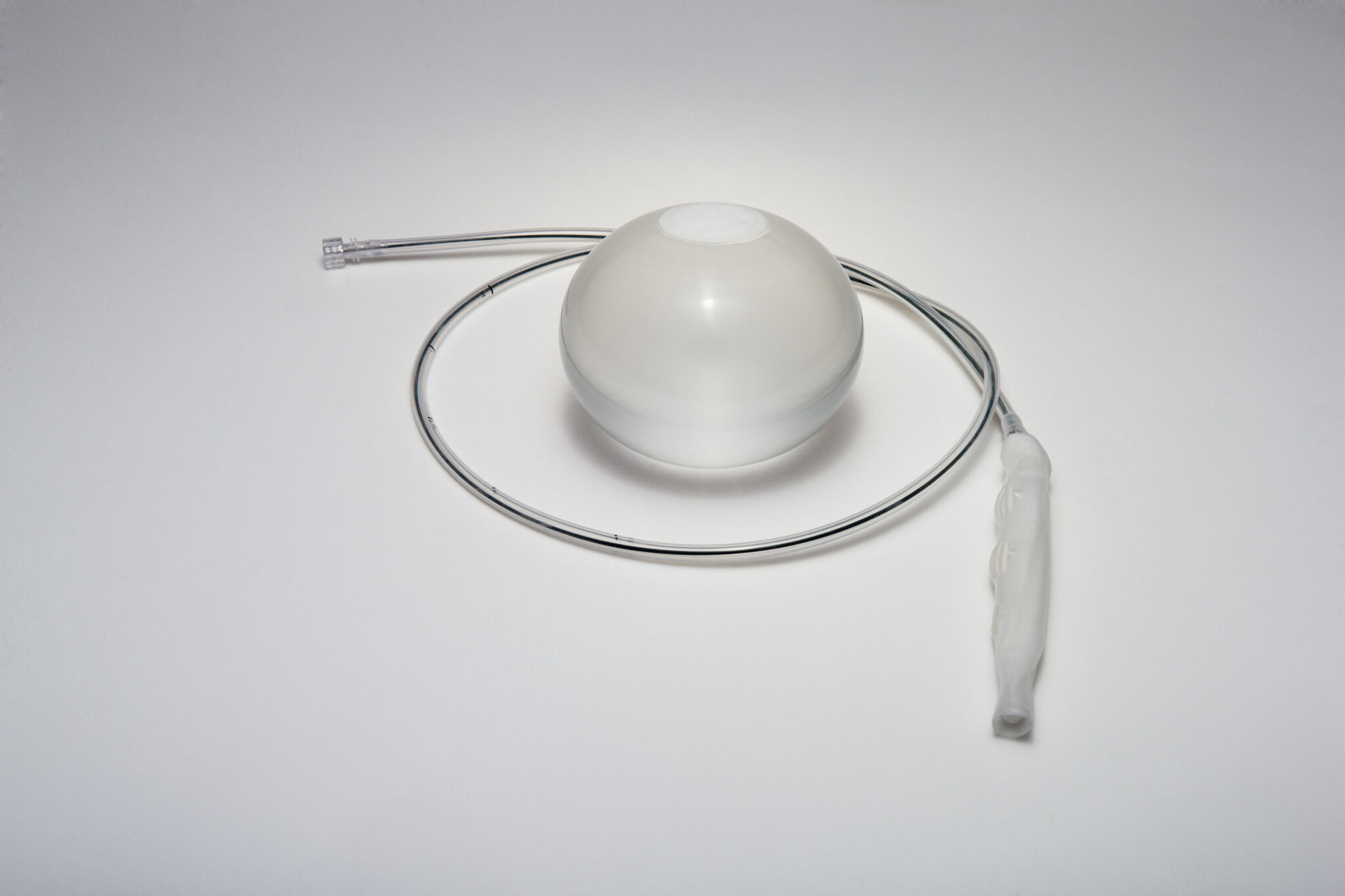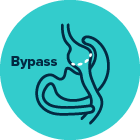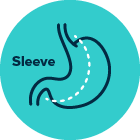CQC registered providers - rated good
12-month Gastric Balloon
Orbera 365 Gastric Balloon Clinic - FDA Approved
Orbera 365: 12-Month Gastric Balloon
Throughout your weight loss journey, a gastric balloon procedure can be a key tool in helping you get to your target weight and set you up with healthy habits for long-term success. The Orbera 365 is a gastric balloon weight loss tool that is placed in the stomach endoscopically, under light sedation, for up to 12 months. Patients will typically lose an average of 10-18% of their body weight with the Orbera 365 gastric balloon. It is the only FDA-approved gastric balloon and requires a minimum BMI of 30 and a maximum of 50 to place.
The Orbera 365 is a soft silicone intragastric balloon that is temporarily inserted into the stomach for up to 12 months. It is a non-surgical procedure that helps a patient lose weight by creating a feeling of fullness. The Orbera 365 occupies 60% of the stomach, reducing the production of ghrelin, the hunger hormone. While it’s designed to be in the stomach for up to 12 months, you can arrange to have the balloon removed beforehand for no extra cost. It is a less invasive option for weight loss than bariatric surgery and carries far fewer risks.
No Incisions, No Scarring, Non-Surgical Weight Loss Balloon
20+
Years of Placements
400,000+
Balloons have been placed around the world
230+
Published Studies
Orbera 365 Procedure
Overseen by GMC Registered Consultants
The Orbera 365 up to 12-month gastric balloon is inserted in a deflated state through the mouth in an endoscopic procedure. Once it’s placed, it will be filled with sterile salt water through a catheter. In order to reduce risks, a patient will be put under light sedation. The balloon has a self-sealing valve and once filled the catheter is gently removed. At this point, the balloon will be too large to leave the stomach without medical assistance.
Eating with an Orbera up to 12-Month Gastric Balloon
1-2
In order to allow your stomach to adjust to the balloon, stick to cold fluids i.e. water, juice and broth, for the first day or two.
3-7
Once simple fluids are tolerated well, you can begin to introduce different fluids such as protein shakes, yoghurt drinks, skimmed milk, and weak coffee or tea (preferably decaffeinated).
2
During the first 2-3 days in week 2 we would expect you to be having semi-liquid food (purees) and begin incorporating soft solids towards the second half of week 2.
When week 3 comes around, it’s time to introduce solid foods into your diet, one at a time, eating slowly and chewing very well.
Placement Day
The whole process normally takes just 20-30 minutes, after which the patient will rest in the clinic for observation before being discharged. Once discharged by a consultant, you will be free to leave but should not drive for 24 hours.
Patients should stick to cold liquids in small amounts and increase the volume when they feel able. If a patient drinks large amounts before the gastric balloon placement there is a higher risk of nausea and vomiting.

The First 6 Months with a Gastric Balloon
Throughout the first year, you will receive support from our HCPC registered dieticians and nutritionist to help you create a healthy, balanced diet that will last for years to come. We recommend that 5 of your 6 sessions be used within the first 6 months.
Having a gastric balloon procedure is no guarantee for a stable weight and continued loss, so it’s important that an informed decision is made. A gastric balloon is simply to help you build good habits into your every day life to have long term success.
Success will ultimately depend on how committed the patient is to adopting the principles of good health into daily life. Our dietitian will guide you through the aforementioned nutrition regimen with calorie restrictions and you can check out our recipes for inspiration.
After six months most patients feel comfortable with what they have learnt and are able to use the balloon for another six months as a reminder of the discipline they must put in place to achieve their healthy and realistic weight loss goals.
Gastric Balloon Removal Day
At 12 months, or earlier, the Orbera 365 will be removed. Similar to placement, the gastric balloon removal takes around 20 – 30 minutes. The balloon will be punctured and the sterile water sucked up through a catheter. Once deflated, the balloon will be removed endoscopically.
Following removal, very few people experience any side effects, but our doctor will keep the patient in the clinic for a couple of hours so that any sedative effects have a chance to wear off and they can be sure the patient is fit to travel. The patient will not be able to drive for 24 hours due to the lasting impact of the sedation, so we always recommend bringing a friend or family for support.
At the end of your Orbera 365 journey, our team will invite you to leave a testimonial outlining your experience with Allure. You can check out our current patient testimonials.
Consultant Surgeon Mr Madhok Discusses Gastric Balloons
Other Procedures

BiB 6 Month Balloon
The BIB 6 month gastric balloon is a weight loss balloon that stays in your stomach for up to 6 months, where it suppresses your hunger and leaves you feeling fuller for longer in order to help you lose weight.

Gastric Bypass
A roux-en-y gastric bypass surgery creates a new structure out of the existing stomach to create a small pouch. It bypasses a portion of the stomach in order to reduce the amount of food you can eat at any one time to help you lose weight.

Gastric Sleeve
Typically performed as a laparoscopic surgery, a gastric sleeve (sleeve gastrectomy) removes around 80% of the stomach to create a tube or sleeve-like structure in order to reduce the amount you can eat and thus lose weight.
Am I suitable?
The BiB 6 month gastric balloon is a tool to help you take control of your weight and give you the kick-start to a healthier lifestyle. Studies show that patients who have undergone the BIB Gastric Balloon System procedure are more likely to maintain their weight loss over a longer period of time than compared to diets alone. 3
You must have a BMI of between 30 and 50 for placement.
In addition, there are certain medical reasons for which you may not be eligible for treatment with the BiB System. These may include:
- Previous history of gastric surgery, or a large hiatal hernia
- Unwillingness to adopt the dietary habits critical to the success of the Therapy
- Drug or alcohol addiction
- Pregnancy or breast feeding
- Inflammatory disease of the gastrointestinal tract
- Upper gastrointestinal bleeding conditions or congenital anomalies of the gastrointestinal tract

Book Your 12-Month Gastric Balloon UK Placement
Speak with the Allure Weightloss medical specialists today in order to book your consultation for the 12 month gastric balloon UK placement. Simply call 03455 120 094 now, or email . Alternatively, feel free to fill out our enquiry form below.
12-Month Gastric Balloon UK FAQs
There are certain medical reasons which may mean you are not eligible for treatment with the Orbera up to 12-month gastric balloon (UK). These may include:
- Previous history of gastro-intestinal surgery, or large hiatal hernia
- Unwillingness to adopt the dietary habits critical to the success of the Therapy
- Drug or alcohol addiction
- Pregnancy or breast feeding
- Inflammatory disease of the gastrointestinal tract
- Upper gastrointestinal bleeding conditions or congentical anomalies of the gastrointestinal tract
- The required use of NSAIDs
- The required use of lithium
Gastric balloons have been used in the management of obesity for over 20 years. Over this time they have evolved in shape, size, and design resulting in a modern, durable product, which is now well established as a safe weight loss procedure. Over 300,000 Orbera balloons have been placed worldwide.
Orbera has been used in over 300,000 cases and reviewed in over 230 published global clinical papers, and a balloon deflation or leak is a very rare event. However, if the balloon should spontaneously deflate, you may no longer feel full after eating. If you suspect this may be the case, notify your specialist immediately. A simple abdominal x-ray can determine whether either has occurred. If it has, your specialist will arrange to remove the deflated balloon.
Published clinical studies of Orbera have shown that, provided you keep to the prescribed diet and exercise regime, you will maintain weight loss through dieting post-removal. So, if you stick to your new, healthy lifestyle you will be well on the way to maintaining your weight loss.
It is very likely that the presence of the balloon in the stomach will cause nausea or vomiting after placement. In some patients it may last one to two weeks. Your doctor may prescribe medication to help minimise these potential effects. Patients will need to immediately contact their physician for any severe or unusual symptoms.
You will be required to take clear fluids only for 2 days prior. You will then be nil by mouth from midnight the night before. This is to ensure your stomach is empty. If food is found your removal will be abandoned and a fee will apply.
Case Studies
Take a look at some of our incredible weightloss success stories




